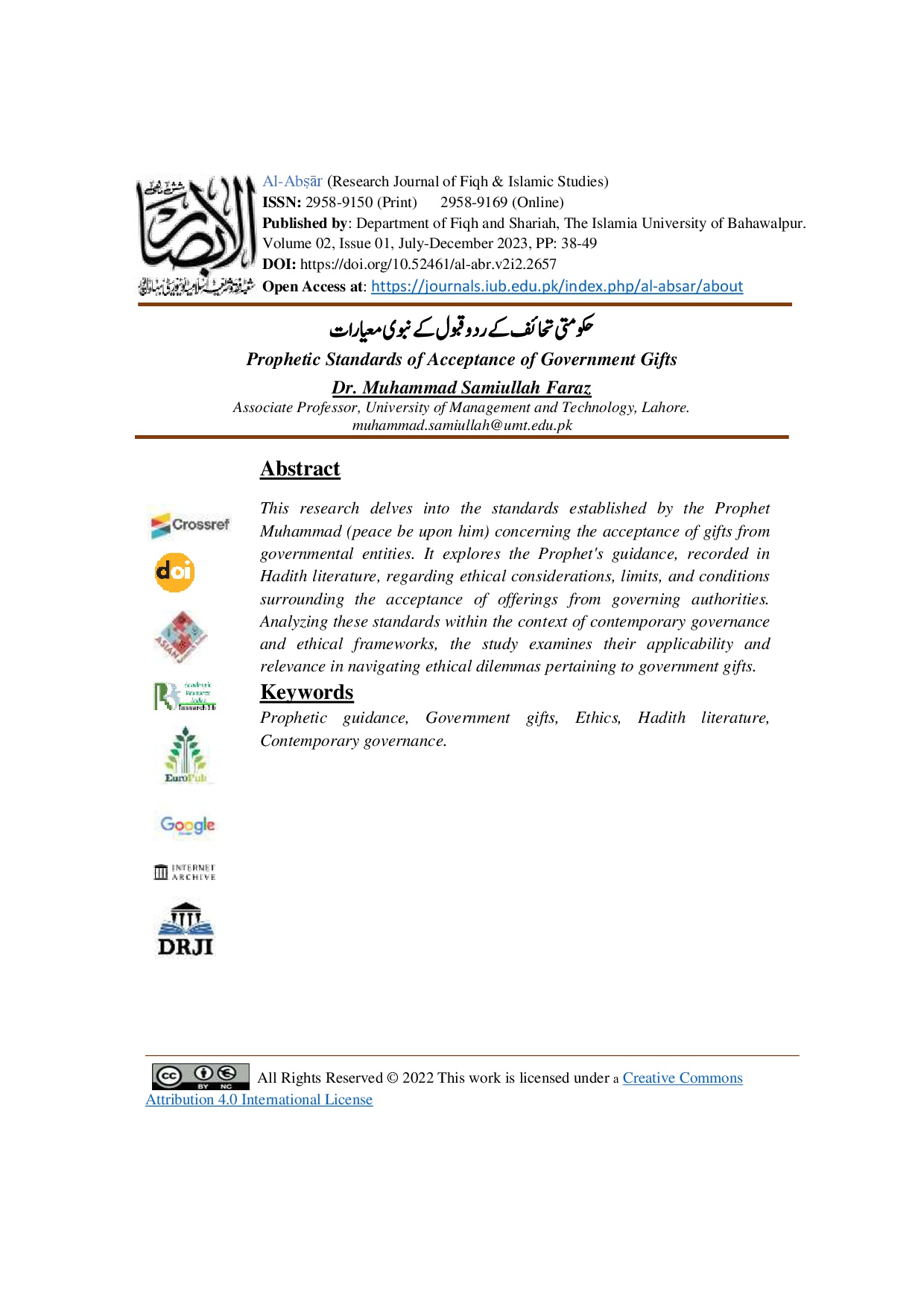Prophetic Standards of Acceptance of Government Gifts
حکومتی تحائف کے رد و قبول کے نبوی معیارات
DOI:
https://doi.org/10.52461/al-abr.v2i2.2657Keywords:
Prophetic guidance, Government gifts, Ethics, Hadith literature, Contemporary governance.Abstract
This research delves into the standards established by the Prophet Muhammad (peace be upon him) concerning the acceptance of gifts from governmental entities. It explores the Prophet's guidance, recorded in Hadith literature, regarding ethical considerations, limits, and conditions surrounding the acceptance of offerings from governing authorities. Analyzing these standards within the context of contemporary governance and ethical frameworks, the study examines their applicability and relevance in navigating ethical dilemmas pertaining to government gifts.
References
البخاری ، محمد بن اسمعیل، الجامع الصحیح، کتاب الاحکام، بَابُ مَنِ اسْتُرْعِيَ رَعِيَّةً فَلَمْ يَنْصَحْ۔ رقم الحدیث: 7151
Bukhārī, Muḥammad ibn Ismāʿīl, al-Jāmiʿ al-Ṣaḥīḥ, Kitāb al-Aḥkām, Bāb man isturʿiya raʿiyyatan falam yansaḥ. Raqm al-ḥadīth: 7151
Smith, J. (2020). Diplomatic Gift-Giving in the 21st Century: Practices and Protocols. International Journal of Diplomatic Studies, 10(2), 145-162.
Ibid
Smith, J. (2020). Diplomatic Gift-Giving in the 21st Century: Practices and Protocols. International Journal of Diplomatic Studies, 10(2), 145-162.
Jones, A. (2018). The Ethics of Government Gift-Giving: Balancing Diplomacy and Accountability. Journal of Political Ethics, 35(4), 401-418.
Ibid
United Nations. (2019). Guidelines for the Acceptance of Gifts by Government Officials. New York: United Nations Publications.
World Bank. (2021). Transparency and Accountability in Government Gift-Giving: Best Practices and Case Studies. Washington, DC: World Bank Publications.
Johnson, M. (2017). Cultural Considerations in Diplomatic Gift-Giving: A Comparative Analysis. Journal of International Relations, 25(3), 277-294.
البخاری، الجامع الصحیح، کتاب الحیل ، بَابُ احْتِيَالِ الْعَامِلِ لِيُهْدَى لَهُ، رقم الحدیث: 6979
Bukhārī, Muḥammad ibn Ismāʿīl, al-Jāmiʿ al-Ṣaḥīḥ, Kitāb al-Ḥiyal, Bābu iḥtiyāl al-ʿāmil liyuhdā lahu, Raqm al-ḥadīth: 6979
البخاری، الجامع الصحیح، کتاب فرض الخمس، بَابُ قَوْلِ اللَّهِ تَعَالَى: فَأَنَّ لِلَّهِ خُمُسَهُ، رقم الحدیث: 3118
Bukhārī, Muḥammad ibn Ismāʿīl, al-Jāmiʿ al-Ṣaḥīḥ, Kitāb Farḍ al-Khums, Bābu qawl Allāh taʿālā: Fa'anna lillāhi khumusahu, Raqm al-ḥadīth: 3118
احمد بن حنبل، المسند، مسند الانصار، رقم الحدیث: 22239
Aḥmad ibn Ḥanbal, al-Musnad, Musnad al-Anṣār, Raqm al-ḥadīth: 22239
الشيخ نظام وجماعة من علماء الهند، الفتاوى الهندية،ج 3,ص 331
Al-Shaykh Niẓām wa-Jamāʿah min ʿUlamāʾ al-Hind, al-Fatāwā al-Hindīyah, 3: 331

Downloads
Published
How to Cite
Issue
Section
License
Copyright (c) 2023 Dr Muhammad Samiullah

This work is licensed under a Creative Commons Attribution-NonCommercial 4.0 International License.





